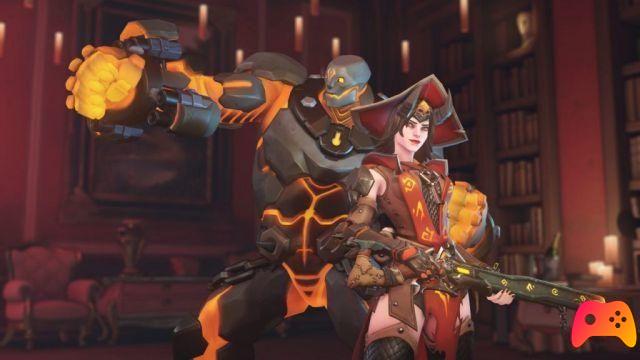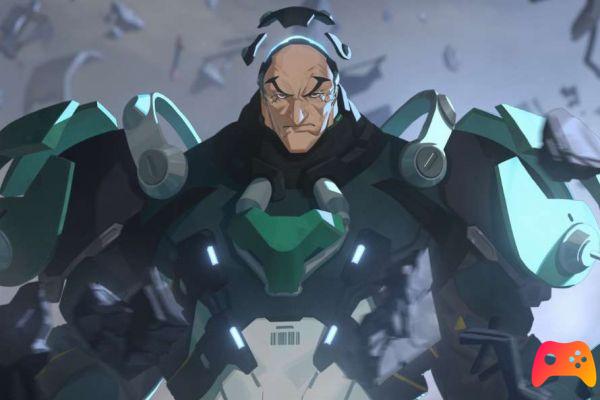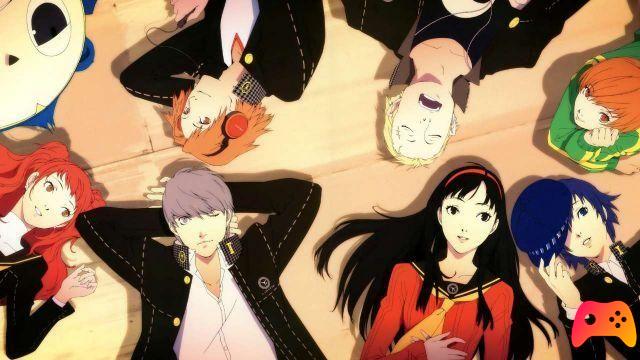
Review for Overwatch. Game for PC, PlayStation 4, Xbox One and Nintendo Switch, the video game was released on 24/05/2016 The version for Nintendo Switch came out on 15/10/2019
Miracles are an otherworldly epiphany that rarely occurs and of which only a few can claim to have had any. The term "miracle", however, has over time taken on profoundly different connotations which - in a more or less evident way - have increasingly expanded (but also distorted) the essence of the term itself. Let's face it: a miracle, a purely religious belief, has little to do with technology and scientific progress, bitter enemies since the dawn of time, but which in some (rare) cases have proven to be able to coexist. In a constantly evolving generation, in which smartphones speak and learn from the owner and technology in general envelops us more and more with its cybernetic and invisible arms, we have learned to live with the genesis of the improbable aforementioned trinomial.
Fortunately, however, there are always those who manage to come up with something special from their hat, capable of stirring the interest of even the most insensitive of brains.
In the gaming field, Nintendo has learned to play this role which - thanks to its Nintendo Switch from beyond 30 million of units sold in less than three years - has begun a journey with increasingly miraculous connotations, it must be said. Let me be clear, not so much for the power of the machine, which is objectively much lower than the competition, but for what it can do with the means available. This can be summed up briefly with an annoying but all in all successful term: conversion.
More and more titles, coming from other realities, have begun to appear on the less gifted nintendary shores with results, needless to say, often miraculous. Just think of products like Doom or Wolfenstein, Dark Souls or the most recent The Witcher 3. Although with due technical limitations, seeing them start on the small 6,2 "screen of the Nintendo hybrid was one of the most exciting points of the current generation of consoles. and, we are sure, it will be for some time yet. For this reason, but also because we are uncontrollable admirers of the work in question, when the porting of Overwatch: Legendary Edition to Switch was announced, we began to not believe our eyes.

Would it really have been possible to play Blizzard's hero shooter in portability? Apparently yes and after having spent a busy week in the company of Junkrat, Mercy and of all the other splendid protagonists of the usual - masterful - imaginary created by Blizzard we are ready to tell you about it. Spoiler: yes, it's a little miracle.
"Bomb in ... Pocket!"
We all agree that just seeing the Overwatch: Legendary Edition logo on the Switch display is already a not indifferent blow to the heart for all lovers of the Blizzard brand, right? Objectively, however, it must be admitted that - at the same time - we all have a bit of a twist when presenting the project, due in particular to a small (large) detail: the frame-rate. After all, running a small stylistic and playful masterpiece on the modest “Blaugrana” machine is not exactly a trivial matter and it is right to take it into account for the overall evaluation. Nevertheless, it is undeniable how much the choice to saddle that damned lock on 30 fps with the most loved and played hero shooter in the world has generated many doubts regarding a production seen from the very first bars as a mere commercial move. And then there were all those convinced of the impossibility of making the most of the inconvenient Joy-Con or doubting about the actual portability performance of the title. All doubts that indeed were swept away fairly quickly after the very first games.

Yes, we absolutely do not want to say that it is easy not to notice the difference between 60 fps of PlayStation 4 and Xbox One or the 100 and pass of top-of-the-range PCs, but we can guarantee that, after the first “Deathmatch Chateau” played comfortably on your bed, you will be immediately willing to turn a blind eye, and maybe even two. Because basically as with every port made on the Switch so far, it's all about this: accepting the obvious limitations of the machine and at the same time embracing the equally numerous advantages offered by the game in portability. To be fair, we'd like to tell you that, especially in tablet mode, the same halved frame-rate, but also the numerous reduced graphics effects, don't feel as heavy as it might seem.
It is clear how to a trained eye it becomes immediately clear how much less clean and deep the overall image of Overwatch: Legendary Edition is, especially if you attach the console to the TV (in our case a 43 ”4K / HDR 10 from Samsung), but we're certainly not making a sensational discovery. The lower computing power of the Nintendo hybrid inevitably affected the conversion of a colorful and artistically impressive title, which here certainly loses part of its luster, at least on a strictly technical level. Together with the frame rate locked at 30 fps, in fact, we must take into account an overall resolution that does not go beyond 900p in docked mode and 720p (more than acceptable) in that handled, which undoubtedly makes the qualitative plan set by Blizzard in the realization of its gem less thorough.

Overall, however, all this affects only in a relative way on what is the fun offered by Overwatch: Legendary Edition which, we reiterate, especially in "tablet" mode manages to mask in a much better way all the technical limits that it carries. It must be said, however, that if in handled mode everything becomes less heavy, at the same time it is also more complex to train the eyes to "endure" so much action and frenzy on the small Switch screen that, in the most excited phases, in portability, it is overall less clear to follow, also due to a slight "blur" effect that occurs in some situations.
Pocket-sized fun
The aesthetic limits of the conversion, evident but not as striking as they might seem based solely on the numbers, almost completely disappear when it comes to gameplay and playful offer, which has nothing to envy to its more noble counterparts. In fact, in the Switch version of Overwatch: Legendary Edition, all the heroes are present (and also several free skins, daughters of the "Legendary" version) and all game modes, including competitive ones, unlockable, however, only after reaching level 25. Whether it's a simple Quick Match or the most demanding Arcade challenges, the soul of the title remains absolutely unchanged and, indeed, takes on new characteristics to brag about.

In handled mode, for example, Overwatch: Legendary Edition looks strangely familiar right from the start (it must be said that the undersigned has been a veteran since day one, and therefore could have advantages from this point of view), thanks to an overall simple to follow and fully enjoyable command scheme. Playing Overwatch: Legendary Edition with the small buttons of the console is unexpectedly simpler than expected and above all fun, and this increases exponentially thanks to the possibility of using the console gyroscope to aim (all easily settable in the command settings), which makes - in the long run - the playful style of the production is even more satisfying and profound. This "advantage" is slightly lost when you prefer to play with the console attached to the TV, comfortably seated on the sofa and with the help of a Pro Controller.

With the "standard" controls, the quality of the control scheme that adapts to portability is certainly less noticeable, while maintaining an excellent general feeling, in which once again the possibility of relying on the gyroscope can be a great addition relevance and not to be underestimated. It must be said that, in many cases, at least at the beginning it will seem more comfortable to use heroes who do not use real firearms to attack, since you will seem to "waste" as few attacks as possible thanks to hits such as Moira's energy flow or the Junkrat bombs, but we can reassure you that this is only an initial settlement phase.
What can be seen, in both modes, is certainly a much less evident general “frenzy”, also the result of the less performing frame-rate, in which even some elements such as the feedback of the shots appear a step below the more noble counterparts. However, these are trifles related more than anything else to the game in docked mode, certainly the least recommended, where it was decided to buy Overwatch: Legendary Edition Blizzard for the little girl of Nintendo.

Let us say it with heart in hand: playing Overwatch: Legendary Edition on Nintendo Switch is a pleasure that goes beyond simple statistical and numerical combinations, and you could probably seriously consider the purchase even if you are in possession of one of the most performing versions . But be careful: the little miracle accomplished with this porting claimed another illustrious victim in its path. Let's talk about the battery, which is also halved after a few games. We hope, from this point of view, some improvement in the future.
Servers never dies!
Also because, and this is a pleasant surprise, servers on Switch perform very well, net of all the limitations of a console Wi-Fi that is anything but idyllic and even the matchmaking is all in all fast, even if not in all modes. During our tests, carried out during a beautiful week full of games, we actually happened to find some difficulties in finding games in some Arcade or Competitive modes, perhaps a sign of the lack of confidence given to the maneuver, with an installed base probably lower than what deserved. For this, surely, there will be time, but it is fair to point out that in order to play Overwatch: Legendary Edition on Switch you need a subscription to Nintendo Online, which is actually included in the price of the title (for 3 months, then you have to renew the subscription).

The overall picture of account and online management closes with the controversy, in our view quite sterile that sees the loss of progress in terms of collection and account level as the protagonist. It does not happen between the various “home” consoles and not even on PC and, therefore, we cannot understand why it has become the subject of discussion now that it does not even happen on the small Nintendo. What surprised us - positively - is the presence of the voice chat conveniently inserted on the console and which therefore does not require the aid of the smartphone app which, objectively, makes everything faster and much more comfortable.

Overwatch: Legendary Edition on Switch is a little daydream. Once the various compromises of a technical nature have been understood and digested, it is clear how being able to enjoy Blizzard's hero shooter in portability is an almost unparalleled playful pleasure and that, especially the most loyal to the brand, should not be missed. Of course, we are not faced with a sensational port and 30fps is a heavy burden for a game of this kind, but we feel like looking at the glass half full and not half empty, because you could (re) discover unparalleled fun and that could "Stealing" many hours of videogames. If you are a "rookie", and maybe you are also fond of numbers and graphics, perhaps it is better to aim for a different version.
► Overwatch is an FPS-type game developed and published by Blizzard Entertainment for PC, PlayStation 4, Xbox One and Nintendo Switch, the video game was released on 24/05/2016 The version for Nintendo Switch came out on 15/10/2019






